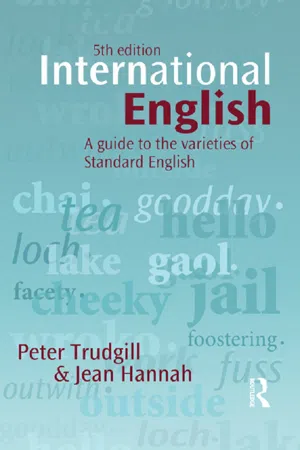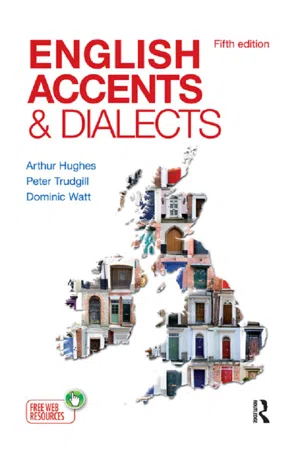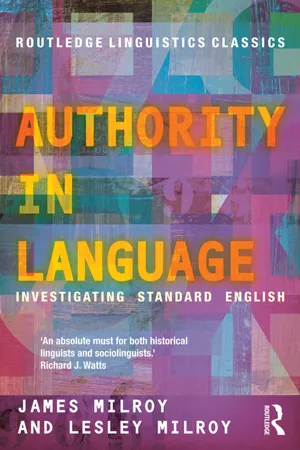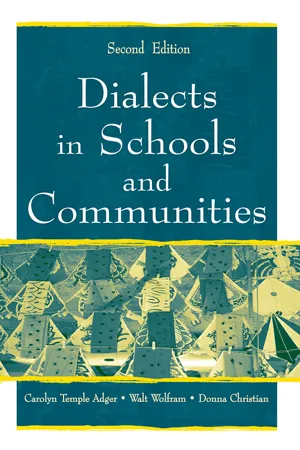Languages & Linguistics
American English Vs British English
American English and British English are two major varieties of the English language, differing in spelling, vocabulary, and pronunciation. Some common examples of differences include the use of "color" in American English and "colour" in British English, and "apartment" in American English and "flat" in British English. These variations have developed over time due to historical, cultural, and geographical influences.
Written by Perlego with AI-assistance
6 Key excerpts on "American English Vs British English"
Learn about this page
Index pages curate the most relevant extracts from our library of academic textbooks. They’ve been created using an in-house natural language model (NLM), each adding context and meaning to key research topics.
- eBook - ePub
- Vivian J Cook(Author)
- 2014(Publication Date)
- Routledge(Publisher)
Herald Sun (Australia), it is impossible to tell where they come from in terms of the English writing system alone. Unlike the spoken language, there is no written ‘accent’ that betrays the person’s origin, beyond the American/British styles of spelling. Written English has not so much adapted to local circumstances as remained constant regardless of the variations in writers and readers. In a way it resembles the success of the Chinese writing system at unifying speakers of many dialects through a single writing system. Written English too can be read by people who might find it difficult to understand one another in speech.Yet this does not mean that there is complete uniformity within the English writing system. The most obvious variation that most people are aware of is that between British and American spelling. Task 1 tests some of the familiar shibboleths. Let us go over some of the salient differences between these two styles of spelling. Usage is often not firmly demarcated to particular language communities. Nor are the rules applied consistently within one language area. They also vary from person to person, or publisher to publisher. Furthermore, the differences are mainly based on the pronouncements of manuals of style and spelling rather than on the description of large corpora of written English. Both in Britain and in the USA, such manuals differ among themselves as to the preferred spelling for particular words. Sources for the following are mainly the British Carney (1994) and the American Venezky (1999).Task 1. American and British variants
Which are British variants, which American?
Answers at end of chapterAmerican British American British 1 kerb □ □ 7 ameba □ □ 2 enrollment □ □ 8 kidnapper □ □ 3 traveller □ □ 9 judgement □ □ 4 favor □ □ 10 litre □ □ 5 defense □ □ 11 analyze □ □ 6 tyre □ □ 12 catalog □ □ British <-our> versus American <-or>
One give-away to the source of a text is the difference between ‘colour’ and ‘color’, ‘honour’ and ‘honor’, and ‘favourite’ and ‘favorite’. American spelling prefers the <-or> ending, British the <-our>. A similar rule applies to <oul> in some words; British style tends to keep the <u>, American to drop it, as in ‘mould’ versus ‘mold’ and ‘smoulder’ versus ‘smolder’. This is not to say that some American words do not preserve <-our> such as ‘glamour’ and ‘saviour’, and some British words do have <-or>, for instance derived forms such as ‘honorary’, ‘coloration’ and ‘laborious’, and nouns like ‘stupor’, ‘terror’ and ‘squalor’, even though ‘terrour’ is found in the OED - eBook - ePub
International English
A guide to the varieties of Standard English
- Peter Trudgill, Jean Hannah(Authors)
- 2013(Publication Date)
- Routledge(Publisher)
4 English and North American English: Grammatical, Orthographical and Lexical DifferencesAt the level of educated speech and writing, there are relatively few differences in grammar and spelling between EngEng and NAmEng; those which do exist tend to be fairly trivial when considered from the point of view of mutual understanding. Vocabulary differences, on the other hand, are very numerous and are capable of causing varying degrees of comprehension problems. Each of these three areas will be discussed in turn below.It should be noted that we treat EngEng and NAmEng, often, as if they were two entirely homogeneous and separate varieties. This makes the presentation of the facts more straightforward, but it does obscure, to a certain extent, the fact that there is regional variation, even in Standard English, in the two areas. There is also considerable influence of the one variety on the other, particularly of NAmEng on EngEng; thus, what is NAmEng usage for older English people may be perfectly normal EngEng usage for younger English people.4.1. Grammatical Differences In this section we will discuss differences both in morphology and syntax. We will also note some differences in frequency of use of certain constructions which occur in both varieties. 4.1.1. The Verb 4.1.1.1. Morphology- Inflectional. In English, ‘regular’ verbs are characterized as having two distinct ‘principal parts’: a present tense form, and a past tense/past participle form which is made by adding -(e)d
- eBook - ePub
English Accents and Dialects
An Introduction to Social and Regional Varieties of English in the British Isles, Fifth Edition
- Arthur Hughes, Peter Trudgill, Dominic Watt(Authors)
- 2013(Publication Date)
- Routledge(Publisher)
Another reaction on the part of learners who fail to understand what is being said may be to think that perhaps what they learned in their own country was not ‘real’ English. Fortunately, this is increasingly unlikely to be the case. Although the English they have learned is real enough, it will tend to be limited to a single variety of the language, a variety chosen to serve as a model for their own speech. It will usually be the speech variety of a particular group of native speakers as that variety is spoken, slowly and carefully, in relatively formal situations. Given limitations of time, of teachers’ knowledge, and of students’ aspirations and attitudes, this restriction is entirely reasonable, at least as far as speaking is concerned. Though learners may sound a little odd at times, they will usually be able to make themselves understood. But such a restriction as far as listening comprehension is concerned is less easily justified. While native speakers may be able to decode the learners’ messages, they may lack the ability or the inclination to encode their own messages in a form more comprehensible to learners. In many cases, of course, native speakers will simply not be aware of such difficulties. Even when they are, a common strategy is to repeat what has just been said, only louder, or to revert to ‘foreigner talk’ (‘me come, you go – OK?’), usually making understanding even more difficult. It seems to us, then, that exposure to a number of varieties of English, and help in understanding them, can play an important and practically useful part in the study of English as a foreign language.Even when learners with comprehension problems recognise that English, like their own language – indeed, like every living natural language – is subject to variation, that variation can be so complex and at times so subtle that it is usually a long time before they begin to see much order in it. And native speakers, even those who teach the language, are often hard put to explain the things that puzzle learners. For this reason, we will attempt now to give some idea of the principal ways in which British and Irish English speech varies and, just as importantly, the non-linguistic (social, geographical) factors which condition that variation. It is hoped by doing this to provide a framework within which to set the features of social and regional variation, which will be our main concern in the remainder of the book.Variation in Pronunciation
Received Pronunciation
We should first make clear the way we are going to use two important terms, dialect and accent - eBook - ePub
Authority in Language
Investigating Standard English
- James Milroy, Lesley Milroy(Authors)
- 2012(Publication Date)
- Routledge(Publisher)
9 TWO NATIONS DIVIDED BY THE SAME LANGUAGE? The standard language ideology in Britain and the United States9.1 Some beliefs about Standard EnglishComments on Standard English and criticisms of non-standard speakers are commonplace in both Britain and the United States, but the most contentious public debates about language are framed rather diff erently in the two countries. It is diffi cult to imagine a long-running controversy in the United States with all the ingredients of the great grammar debate which we alluded to in Chapter 8 . Equally, it is hard to imagine the British press focusing over many years on an English Only movement or on whether British Black English should be taught as a separate language, as in the Ebonics debate. In this fi nal chapter we shall consider some social and historical factors underpinning these somewhat diff erent manifestations of the standard language ideology. We begin by looking more closely at the term ‘Standard English’ when used in reference to a spoken norm.Although not all scholars are in agreement with us, we suggested in Chapter 1 that standardisation was best treated as a process, since attempts to locate a specifi c standard (product) are by defi nition doomed to failure. We also saw that phonology was particularly resistant to standardisation. Hence some scholars identify the standard as a prestigious system of grammar and lexis which can be realised with any phonological system; for them there is no such thing as a ‘standard accent’. However, in practice Received Pronunciation (RP) is often treated not only by the general public, but also by some professional linguists as a reference accent and described as ‘Standard English’ (Smith, 1996:65). In the United States, so-called ‘network American’1 is often identi-fi ed as Standard English, although RP and network American are horses of a very diff erent colour. Network American is a mainstream accent associated with the levelled dialects of the Northern Midwest, where salient locally marked features have been eradicated, so that they are commonly perceived as ‘colourless’ or ‘characterless’ (Wolfram, 1991:210). Speakers of such dialects commonly describe themselves and are described by others as having ‘no accent’ (Preston, 1996). In Britain, it seems to be RP speakers who are typically described in this way, although unlike network American, RP is saliently marked for class and in no sense is, nor ever has been, a mainstream accent. Thus, with respect to spoken language, the term standard means something quite diff - eBook - ePub
- Carolyn Temple Adger, Walt Wolfram, Donna Christian(Authors)
- 2014(Publication Date)
- Routledge(Publisher)
Standard American English, then, is a composite of the real spoken language of this group, generally professionals, the educated middle class. Because members of this group in Chicago might sound quite different from their counterparts in Atlanta, it is important to recognize the existence of a number of dialects of Standard American English. For the most part, there is more shared structure in the grammar of Standard English speakers across communities than in pronunciation, but there are still some regional grammar differences that keep us from concluding that a single set of standard grammatical features exists. Different communities may have slightly different norms, and this informal set of norms is the one that really counts in terms of social acceptance. It is important, for this reason, to carefully distinguish between those norms that make up the formal standard and the informal, yet highly influential, norms of social acceptability that govern most everyday, interactional evaluations of standardness.The situation becomes quite a bit more complicated when we consider World Englishes—the varieties of English spoken in other countries. Just as in the United States, there are standard and vernacular English language varieties in countries that were colonized by English speakers, where English has become the mother tongue of most people (e.g., New Zealand) or a second language spoken by nearly everyone for certain purposes, such as business and higher education (e.g., Nigeria). English is used for special purposes in many other countries as well, and local standards have developed. When English speakers travel abroad, they may find that speech considered standard in their own country is difficult to understand, odd, even nonstandard according to the standards of the host country. Here again Standard English is relative to the particular norms of the speech community. Standard Singapore English is very different from any version of Standard American English. Thus, it is more accurate to speak of Standard Englishes than of just one Standard English.We use the term Standard English as a proper noun with a capital s on standard, but we intend it as a collective noun. Standard English is a collection of the socially preferred dialects from various parts of the United States and other English-speaking countries.Dialects and UnderstandingGiven the differences among English dialects, it stands to reason that communication among speakers of different dialects might be flawed occasionally. Although problems in comprehension and interpretation can arise, the severity of these problems and their precise source are not always clear.Certainly, there are Standard English speakers who claim not to understand vernacular speakers. To put this in perspective, however, we have to realize that we may also hear this claim from a person traveling through another region, such as a Northerner in the South or a person from the mainland visiting a historically isolated island area in the Chesapeake Bay or the Outer Banks off the coast of North Carolina. In most cases, such reports are exaggerated based on a few items that may legitimately prove troublesome for an outsider to comprehend. An outsider in Appalachia for the first time may have difficulty comprehending certain ire words such as fire (pronounced much like far) or buyer (pronounced much like bar), or a vocabulary item such as garret for attic or vittles for food - eBook - ePub
- Robert D. King(Author)
- 2021(Publication Date)
- Austin Macauley Publishers(Publisher)
Chapter 10 British Versus “American”: Noah Webster
English [British English] has been arrested in its growth by its purists and grammarians. It shows no living change in structure and syntax since the days of [Queen] Anne and very little modification in either pronunciation or vocabulary.—H.L. Mencken (1880–1956), The American Language."Virginians have little money and great pride, contempt of Northern men and great fondness for dissipated life. They do not understand grammar." —Noah Webster, Jr. (1758–1843)Even American children these days can detect a British accent when they hear one. And if they are bookish, they soon notice that British spelling and vocabulary are different from ours. Words spelled differently in British publications like colour, centre, tyre, and connexion are easily mastered. Gaol for ‘jail’ is a bit of a stretch, but it seems to be becoming a bit of a stretch for the Brits too. [When in high school, I read Oscar Wilde’s The Ballad of Reading Gaol. I pronounced ‘gaol’ as ‘gale’ until I learned better—how, I cannot remember.]Then there are the different words with different meanings: ‘braces’ are ‘suspenders’ in British English, ‘lorry’ is ‘truck,’ ‘nappies’ are ‘diapers,’ ‘mean’ can mean ‘cheap, miserly.’ ‘He knocked her up’ in British Englishdoes not necessarily mean that he got her pregnant; it can mean that he knocked on her door to wake her up. (The ‘got her pregnant’ meaning seems to be gaining ground in the U.K. even as the ‘knocked on her door’ meaning seems to be losing ground.) There are also a few differences in syntax and morphology. Where an American will say, “I didn’t give him money; I think I should have,” the Brit might say, “I didn’t give him money; I think I should have done.” ‘I have got old’ is probably more frequently heard at high tables in Oxford and Cambridge than ‘I have gotten old.’ We pronounce láboratory with stress on the first syllable, the British pronounce it with stress on the second syllable, labóratory





